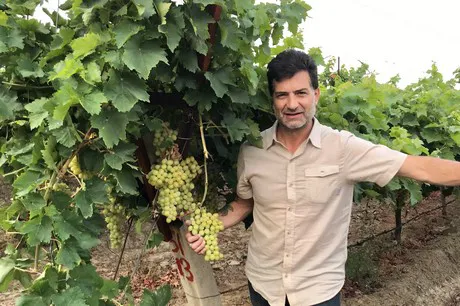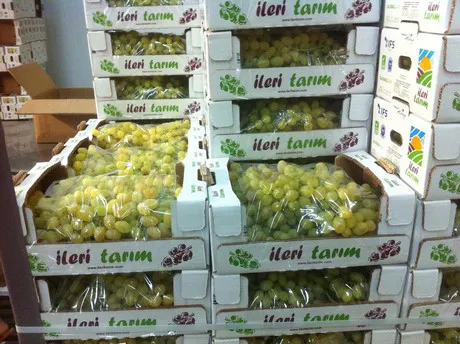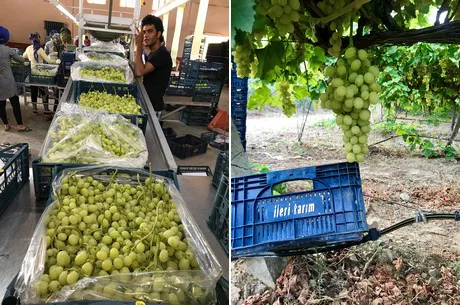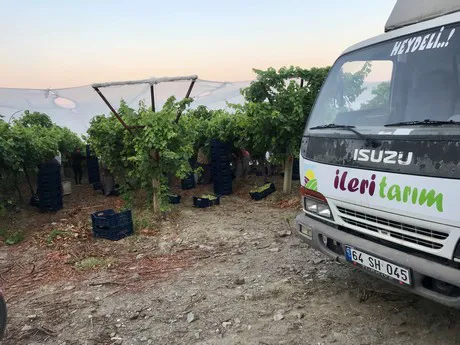The grape harvest in Turkey officially started on the 22nd of July. The Early Sweet and Superior Seedless varieties are the first in line, for which the window is only three weeks. The weather actually caused a lot of issues for these early varieties, but one exporter struck gold by keeping the protection covers on the vineyard for a longer period of time.
The season for the early variety of Turkish grapes has officially started and Ileri Tarim managed to get a head start compared to most other Turkish exporters, says Hakan Ilkkutlu, who is the managing partner for Ileri Tarim. “We had to deal with a lot of rains prior to the harvest period. When raindrops stick to the individual grapes, it causes them to crack. This has been one of the major issues for the past three seasons. Luckily we had decided to extend the period where we cover the vineyards in plastic covering, so thankfully our grapes were not affected by this at all. It should give us somewhat of an advantage for the early varieties.”

The rains, hail and even late spring frosts are a pain in the back for Turkish grape growers. The most important challenge is fungus development. Once this happens in your vineyard, the crops are basically lost, says Hakan. “The biggest problem is the mildew, that is very hard to fight. Once it affects your vineyard you can only try to save as much as you can, but what is affected is lost. Hail damages also enhance fungus development, so the climate changes are definitely an issue. Vineyard management is getting harder every year, also because spraying to battle these fungi is ineffective unless you change the active ingredient frequently.”

And although spraying is a way to somewhat try to prevent these fungi from taking over entire vineyards, it also makes exporting the grapes to Europe a lot harder, says Hakan: “We have to be careful with the amount of residues that are used to protect the grapes. Since we’re global Gap certified we’re required to run tests multiple times during the season. It’s a tricky balance, as not spraying can lose you your entire yield, but spray too much or frequently and your produce is not getting into Europe.”

Despite these challenges, Ileri Tarim is preparing for a successful and busy season ahead of them. The yield will increase a lot compared to last year, although this also has to do with the fact that Turkish grapes suffered major damages from hail last year. “The expectations are that we will harvest about 65 per cent more grapes than we did last season. This is good, as we expanded our programs with our existing buyers, meaning they will purchase more produce than previous years. Our clients are in the United Kingdom, Germany, the Netherlands and Ukraine. The growth we are going for with our current clients means we’re not too focused on penetrating new markets as of yet. However we’ve been eyeing the Chinese market by visiting Asia Fruit Logistica, to see what their customs and requirements are. Who knows, it might become an option in the future.”

The competition for grapes in Europe is fierce, with Italy, Spain and Greece all producing good quality grapes. “The biggest advantage Spain and Italy have over us, is that they know how to use their brand for marketing. They know how to present their produce a lot better than we do,” Hakan explains. “This is where Turkish exporters need to grow; we need better representation of the produce by improving the packaging and making sure our grapes are known by both importers and consumers. We hope to take some significant steps towards that. For those who are attending Fruit Logistica in Berlin, make sure to come visit us and we’ll tell everyone all about the future of Turkish grapes.”
For more information:
Hakan Ilkkutlu
Ileri Tarim
Tel: +90 533 2729 659
Email: hakan@ileritarim.com
www.ileritarim.com
